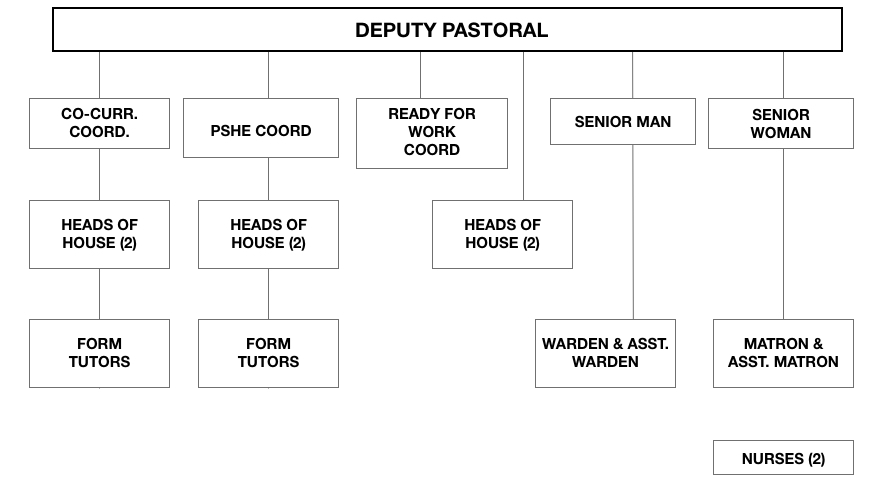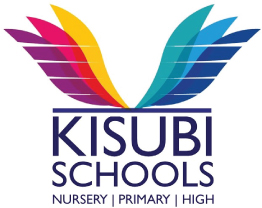PASTORAL BOARDING AND COMMUNITY ENGAGEMENT (PBC) IN KISUBI HIGH SCHOOL
Kisubi Schools are different from other schools in so many ways. One of them is because we handle the students’ wellbeing in a unique way. We have a pastoral boarding and community engagement (PBC) office that is entirely in charge of students’ welfare/wellbeing.
The Pastoral team is headed by the deputy pastoral who is one of the school deputies and is fully accountable for students’ wellbeing in the school.
The pastoral team has a number of members both teaching and non- teaching as follows:
THE PASTORAL TEAM TREE
Areas of focus for the pastoral team
The Pastoral team focuses on the students’ wellbeing and this helps to bring up a happy and successful child (a whole child). The students’ wellbeing is broken down into smaller areas handled by different members in the team.
These include:
- Students general wellbeing – This is taken care of by the Deputy Pastoral working closely with the boarding team to ensuring the students are comfortable in their dormitories and around the school, have balanced and well-prepared meals and are happy to stay in school.
- Spiritual wellbeing – This is taken care of by the pastoral team ensuring the students are nourished spiritually in their different denominations. Kisubi High School is the interdenominational meaning we have different denomination students (Anglicans, Catholics, Born - again and Muslims) and these are given time every Sunday to worship.
We invite different preachers and sheikh who come in to pray with the different denominations every Sunday. - Mental/psychological wellbeing – This is taken care of by the full- time school counsellor who prepares different sessions with different topics to educate the students on how to stay mentally stable. She also meets the students in groups and as individuals to counsel and advise them depending on the issues they have.
- Physical wellbeing – This is taken care of by the co-curricular coordinator and the Heads of House through different games and sports that are well timetabled to help the students keep physically fit, healthy and to develop their different talents.
- Co-curricular
We have games like football, basketball, volleyball, netball, chess, table tennis and students are encouraged to engage in these games. We have coaches for these different games who come in on different days to train the students on different games. The school also awards the two best students in every game with school fees bursaries and this has encouraged students to work hard to compete for these bursaries.
Kisubi High School has won many trophies externally from the different games and this has encouraged our students to continue participating. - House system
The school also has a house system where students are attached to different houses and belong there. These houses are headed by house heads who are also teachers, this gives a student a sense of belonging.
The houses meet once a week to have time to discuss issues concerning the students with their house heads, the house system also natures students’ other talents apart from games and these include music, dance, drama, and debating which also have trainers who come in to train students to perfect their talents and have inter-house competitions every term which eventually earns the winning house a bull at the end of the year. - Health wellbeing – This is taken care of by the nurses who provide first aid, treat sick students and follow up on students with chronic diseases in the school.
- Social wellbeing – This is taken care of by the Personal Social Health Education (PSHE) coordinator in the PSHE sessions, in these sessions’ teachers prepare different topics concerning students’ personal lives, social lives and health where students discuss at length and benefit from the discussions.
The team also takes care of students behaviour to make sure they behave and relate well with the staff and their peers. We have the form of tutors who are local parents to students and follow up on students on a daily basis. - Skills – This is taken care of by the ready for work coordinator who plans sessions for students to learn different soft and hard skills. These sessions are timetabled and happen every day for the different classes, they are taught different skills and these are monitored closely by the teachers.
Examples of skills that we teach include:
- Hard skills - computer skills, financial skills, cooking, sewing, making soap, making books, making paper bags, making shoes.
- Soft skills -communication skills, interpersonal skills, confidence, public speaking, writing skills, leadership, teamwork, critical thinking, positive attitude, work ethics etc.
These skills are very helpful to students in addition to the academic work as we have had some students begin small businesses at home from what they have been taught and earned money to support themselves.
